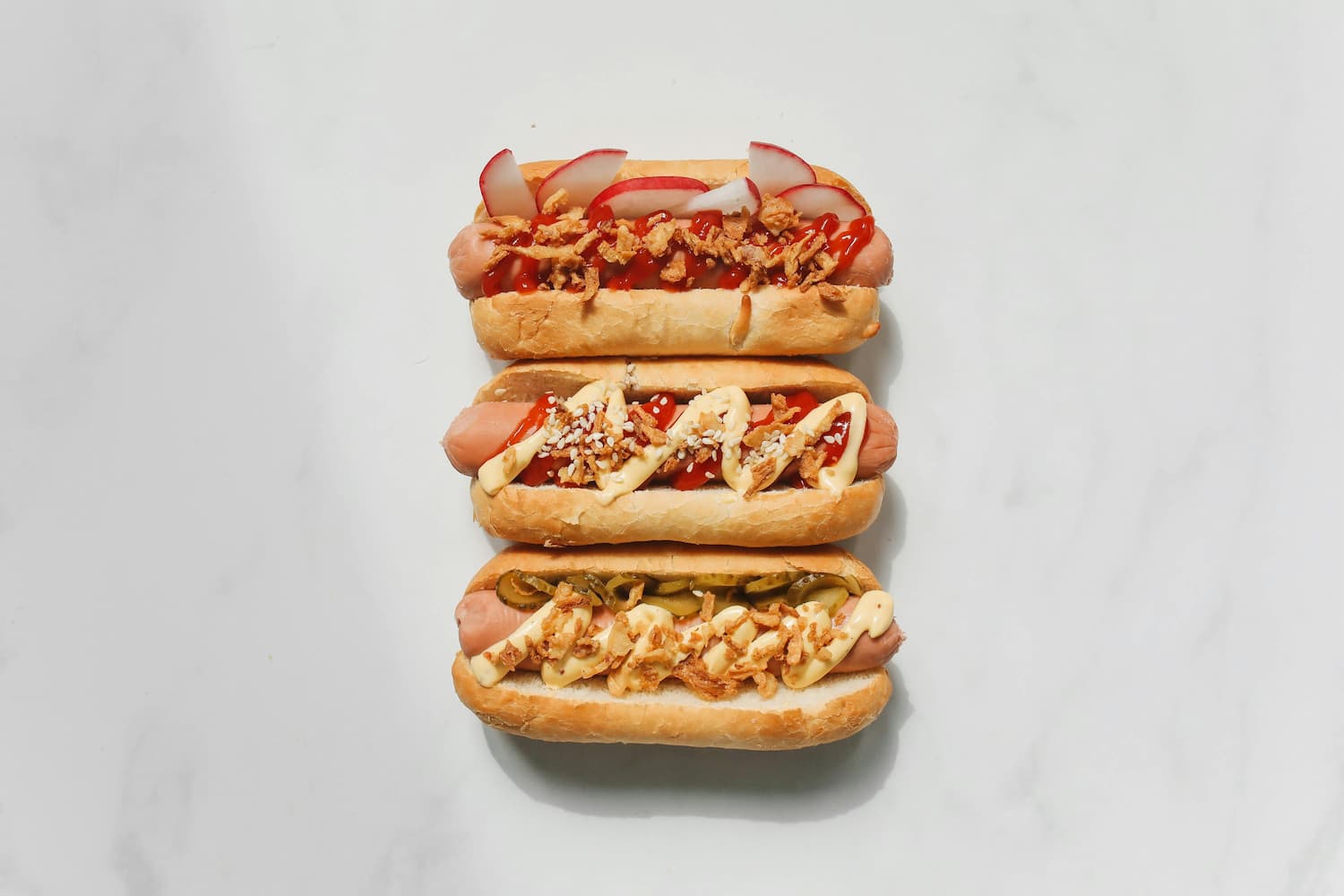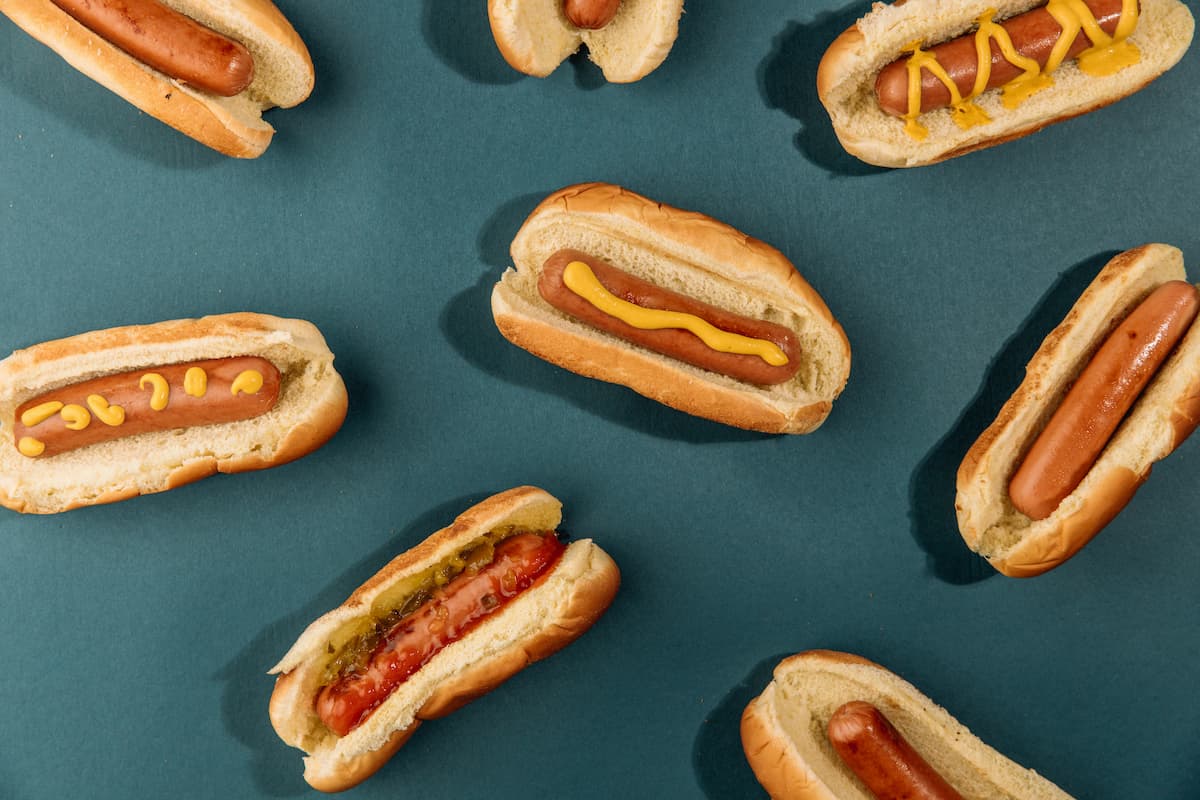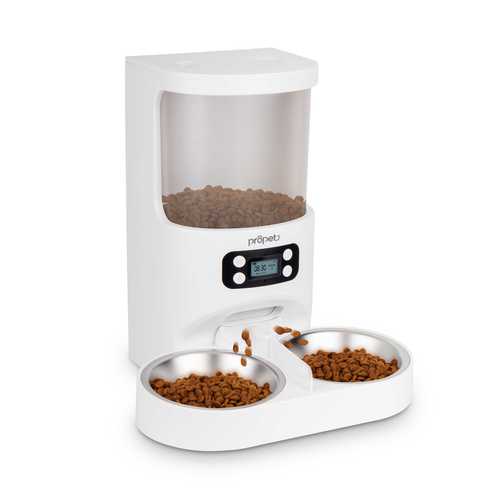As a dog owner, you’ve likely faced those pleading eyes staring up at you during a backyard barbecue or family gathering, silently begging for a bite of your hot dog. It’s tempting to share a piece with your furry friend, but should you? The question “can dogs eat hot dogs” isn’t as straightforward as it might seem. While that processed meat tube might look like the perfect canine treat, the reality is more complicated than you might expect.Through this article, I’ll help you navigate the complexities of feeding hot dogs to your dog, drawing on scientific evidence and veterinary expertise to guide your decision-making.

Can Dogs Eat Hot Dogs?
Yes—with caution. Most hot dogs are not toxic in the way chocolate or xylitol is, but they carry several health risks that make them a poor regular treat for dogs.
Hot dogs are highly processed meat products typically made from beef, pork, chicken, or turkey mixtures. These meats are finely ground and mixed with various spices, preservatives, and flavor enhancers before being stuffed into casings. While the base meats themselves aren’t harmful to dogs, it’s these additional ingredients that raise concerns among veterinarians and canine nutrition experts.
The nutritional value of hot dogs for dogs is minimal at best. While they do provide some protein, the quality of this protein is often lower than what you’d find in fresh, unprocessed meats. More importantly, the high levels of processing involved in hot dog production diminish much of whatever nutritional value the original meats might have contained.
If you do decide to give your dog hot dog as an occasional treat, it should be offered in very small quantities (think pea-sized pieces for smaller dogs) and only very occasionally—certainly not as a regular part of their diet. Always choose plain varieties without added seasonings, and be sure to cut them into appropriate sizes to prevent choking hazards, especially for smaller breeds
Are Hot Dogs Bad for Dogs?
Hot dogs become “bad” when they’re fed often or in large quantities. Here’s why:
Bottom line: a small, plain cooked piece now and then isn’t likely to hurt a healthy adult dog, but hot dogs are not a healthful, regular treat. If you’re asking can dogs eat weenies as a training shortcut, treat them as occasional, high-value rewards—not daily staples.

Can You Use Hot Dogs As Training Treats?
Yes—carefully. The smell and texture make hot dogs a powerful high-value reward for tricky training moments (proofing, distraction training, or introducing new skills). Follow these rules:
If you’re asking can i feed a dog a hot dog during training, the safest approach is: yes—only as an occasional, tiny reward and never as a routine replacement for dog treats formulated for training.
What to Do If Your Dog Eats a Hot Dog?
Most cases are mild, but watch closely and act quickly if needed.
Immediate steps:
If the incident is a single plain bite and your dog remains normal, it’s likely fine—but use the event to plan safer alternatives next time.
Healthier Alternatives to Hot Dogs
If you want to treat your dog at that BBQ or training session, choose options that are safer and more nutritious:
If you want a “hot dog experience” without the risk, consider store-bought pet treats formulated to mimic that flavor, or make a small batch of baked, unseasoned meat bits you control yourself.

Conclusion
While the occasional tiny piece of plain hot dog might not harm your dog, the risks far outweigh the benefits. Hot dogs are nutritionally void, high in sodium and fat, and contain additives that threaten long-term health. Instead, prioritize whole, natural foods that align with your dog’s dietary needs. If you’re ever unsure about feeding human food, consult your veterinarian—they can provide tailored advice based on your dog’s breed, age, and health status.
FAQ
Can puppies eat hot dogs?
It’s better to avoid hot dogs for puppies. Their digestive systems are more sensitive and they need controlled, nutrient-balanced diets for growth. If you must, give only tiny, plain pieces and very rarely—and check with your vet first.
Is it okay if my dog ate a hot dog?
If it was just a small, plain piece, monitor your dog for 24 hours for vomiting, diarrhea, or unusual behavior. If they ate a lot, or if the hot dog had onion/garlic, seasoning, or a high-fat/very salty variety, call your vet or poison-control for advice. Emergency care is needed for choking, severe vomiting, seizures, or collapse.
Are hot dogs safe for dogs to eat?
Not as a regular food. Hot dogs are safe only as an occasional tiny treat and only when they’re plain and free of toxic seasonings. Frequent feeding of hot dogs increases risk of pancreatitis, salt-related illness, and long-term health issues.
What meat is good for dogs?
Lean, cooked, unseasoned meats—chicken, turkey, lean beef—are excellent occasional additions. Commercial dog foods and vet-recommended diets should provide most daily nutrition. Always remove bones, avoid seasonings (especially onion/garlic), and keep treats to a small portion of daily calories.


